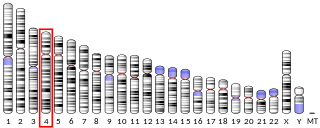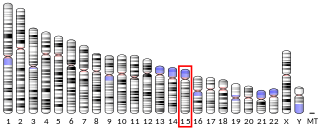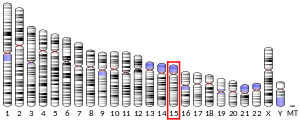
Acyl-CoA synthetase long-chain family member 6 is an enzyme that in humans is encoded by the ACSL6 gene. Long-chain acyl-CoA synthetases such as ACSL6, catalyze the formation of acyl-CoA from fatty acids, ATP, and CoA.

Peroxisomal acyl-coenzyme A oxidase 1 is an enzyme that in humans is encoded by the ACOX1 gene.

Long-chain-fatty-acid—CoA ligase 1 is an enzyme that in humans is encoded by the ACSL1 gene.

Long-chain-fatty-acid—CoA ligase 5 is an enzyme that in humans is encoded by the ACSL5 gene.

Long-chain-fatty-acid—CoA ligase 3 is an enzyme that in humans is encoded by the ACSL3 gene.

Fatty acid desaturase 1 (FADS1) is an enzyme that in humans is encoded by the FADS1 gene.

Long-chain-fatty-acid—CoA ligase 4 is an enzyme that in humans is encoded by the ACSL4 gene.

Acyl-CoA thioesterase 2, also known as ACOT2, is an enzyme which in humans is encoded by the ACOT2 gene.

Long-chain fatty acid transport protein 4 is a protein that in humans is encoded by the SLC27A4 gene. This membrane protein is also called FATP4 or ACSVL5. The purified protein shows enzyme activity, esterifying long and very long chain fatty acids with Coenzyme A. It is debated whether it is also a fatty acid transporter at the plasma membrane.

Acyl-CoA Synthetase, Bubblegum Family, member 1 (ACSBG1) is an enzyme that in humans is encoded by the ACSBG1 gene.

Acyl-coenzyme A thioesterase 4 is an enzyme that in humans is encoded by the ACOT4 gene.

Acyl-coenzyme A thioesterase 11 also known as StAR-related lipid transfer protein 14 (STARD14) is an enzyme that in humans is encoded by the ACOT11 gene. This gene encodes a protein with acyl-CoA thioesterase activity towards medium (C12) and long-chain (C18) fatty acyl-CoA substrates which relies on its StAR-related lipid transfer domain. Expression of a similar murine protein in brown adipose tissue is induced by cold exposure and repressed by warmth. Expression of the mouse protein has been associated with obesity, with higher expression found in obesity-resistant mice compared with obesity-prone mice. Alternative splicing results in two transcript variants encoding different isoforms.

Bile acyl-CoA synthetase is an enzyme that in humans is encoded by the SLC27A5 gene.

Long-chain fatty acid transport protein 6 is a protein that in humans is encoded by the SLC27A6 gene.

Acyl-coenzyme A synthetase ACSM2B, mitochondrial is an enzyme that in humans is encoded by the ACSM2B gene.

Long-chain fatty acid transport protein 3 is a protein that in humans is encoded by the SLC27A3 gene.

Acyl-CoA thioesterase 6 is a protein that in humans is encoded by the ACOT6 gene. The protein, also known as C14orf42, is an enzyme with thioesterase activity.

Acyl-CoA thioesterase 9 is a protein that is encoded by the human ACOT9 gene. It is a member of the acyl-CoA thioesterase superfamily, which is a group of enzymes that hydrolyze Coenzyme A esters. There is no known function, however it has been shown to act as a long-chain thioesterase at low concentrations, and a short-chain thioesterase at high concentrations.

Acyl-CoA thioesterase 13 is a protein that in humans is encoded by the ACOT13 gene. This gene encodes a member of the thioesterase superfamily. In humans, the protein co-localizes with microtubules and is essential for sustained cell proliferation.

Acyl-CoA thioesterase 1 is a protein that in humans is encoded by the ACOT1 gene.



















